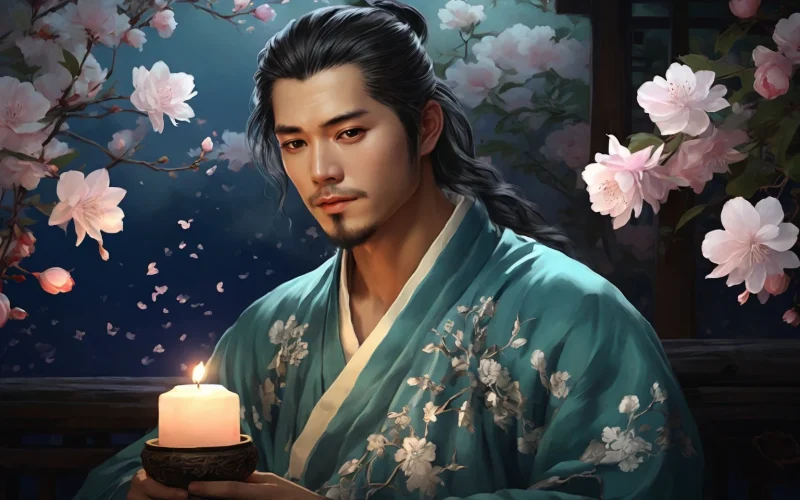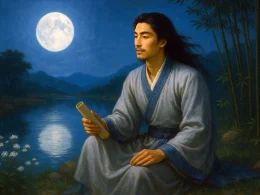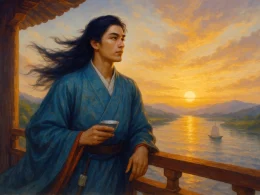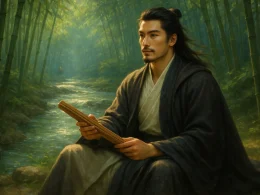Zhou Bangyan (周邦彦 1056 - 1121), a native of Qiantang (modern Hangzhou, Zhejiang), was the culminating master of the wanyue (graceful and restrained) ci poetry of the Northern Song Dynasty. A virtuoso in musical temperament, his ci are renowned for their opulent refinement and technical perfection. He created dozens of new melodic patterns (cipai) and adhered to strict tonal rules, earning him the title "Crown of Ci Poets." His influence extended to Southern Song masters like Jiang Kui and Wu Wenying, establishing him as the founding patriarch of the Rhymed Ci School.
Major Works
Life
Zhou Bangyan's ancestors were originally from Qiantang (modern Hangzhou, Zhejiang) but later moved to Yin County, Mingzhou (modern Ningbo, Zhejiang). From a young age, he displayed extraordinary literary talent and musical aptitude. Historical records note that he was "widely read in the works of the Hundred Schools of Thought, with a particular gift for composing melodies." In 1083, at the age of 27, Zhou entered the Imperial Academy in the capital as an Outer Hall student. His submission of Rhapsody on the Capital of Bian (Biandu Fu), a grand fu poem of over ten thousand characters extolling the splendor of Kaifeng and praising the New Policies, caused a sensation in literary circles. Emperor Shenzong was so impressed that he appointed Zhou as Taixuezheng (Director of the Imperial Academy), marking the beginning of his official career.
During the Yuanyou era (1086–1094), when conservative factions held power, Zhou was ostracized for his earlier support of the New Policies and was relegated to provincial posts such as Professor of Luzhou and Magistrate of Lishui. This period of exile profoundly influenced his writing, inspiring many renowned works expressing the melancholy of travel, such as Courtyard Full of Fragrance: Written on a Summer Day in Lishui's Wuxiang Mountain. In 1097, when reformists regained influence, Zhou was recalled to the capital as Guozijian Zhubu (Secretary of the Directorate of Education). After Emperor Huizong ascended the throne, Zhou's career flourished. He held positions including Mishusheng Zhengzi (Editor in the Palace Library), Xiaoshulang (Proofreader), and Kaogong Yuanwailang (Vice Director of the Bureau of Evaluations). In 1116, nearing sixty, Zhou was appointed Dashengfu Tiju (Director of the Dasheng Music Bureau), overseeing court music composition and revision—the pinnacle of his artistic career.
At the Dasheng Music Bureau, Zhou fully realized his musical talents. He systematized ancient melodies, created new tunes, and collaborated with Moqi Yong and Tian Wei to refine the Dasheng musical system. Many of the self-composed melodies preserved in his Qingzhen Collection, such as Prince of Lanling (Lanling Wang) and Flower Offense (Hua Fan), were products of this period. In 1121, Zhou passed away in Yingtian Prefecture (modern Shangqiu, Henan) at the age of 65. Posthumously honored as Xuanfeng Dafu, he was buried at Nandang Mountain in Hangzhou. During the Chunxi era (1174–1189) of the Southern Song, his grandson Zhou Zhu compiled and published the Collected Works of Master Qingzhen in 24 volumes, ensuring the preservation of this master poet-composer's legacy.
Writing Style
Hailed as the "Du Fu of Ci," Zhou Bangyan's Qingzhen Collection contains 186 ci employing 112 melodic patterns, achieving new heights in thematic exploration, formal innovation, and artistic expression. His works can be categorized into four major themes—object poems (yongwu), romantic lyrics (yanqing), travel verses (jilü), and historical meditations (huaigu)—each boasting timeless masterpieces.
- Object Poems: Zhou's yongwu ci showcase his keen observation and exquisite craftsmanship. Waterbag Dance: Burning Aloeswood (Sumuzhe: Liao Chenxiang) captures the essence of lotus leaves with vivid lines: "Morning sun dries last night’s rain on the leaves; / On clear round water, each lifts in the breeze." Six Ugly: After the Roses Withered (Liuchou: Qiangwei Xie Hou Zuo) personifies fallen petals: "Long stems deliberately snag passersby, / As if tugging sleeves to whisper endless parting sorrow." These works adhere to the tradition of "depicting objects without being confined by them" while advancing a new realm of "profound allegory."
- Romantic Lyrics: Zhou's yanqing ci reveal his nuanced grasp of emotions. Youth’s Wandering: Dagger Bright as Water (Shaonian You: Bing Dao Ru Shui), chronicling his romance with courtesan Li Shishi, contrasts tender moments ("facing each other, playing the sheng") with painful farewells ("horses slip on thick frost"). Song of Gallantry: New Green in the Small Pond (Fengliuzi: Xin Lü Xiao Chitang) expresses unspoken longing through veiled imagery: "I envy swallows flitting to golden rooms, / Their old nests still intact." Though these works touch on sensuality, they remain "elegant without vulgarity, beautiful without licentiousness," elevating the Huajian tradition.
- Travel Verses: Zhou's jilü ci distill his experiences as an itinerant official. Courtyard Full of Fragrance: Written on a Summer Day in Lishui's Wuxiang Mountain (Man Tingfang: Xiari Lishui Wuxiangshan Zuo) echoes Bai Juyi’s Song of the Pipa: "Long I lean on rails— / By bitter bamboo and yellow reeds, / I dream of a boat to Jiujiang." Cold Grated Window: Crows Cry in Dark Willows (Suochuanghan: An Liu Ti Ya) contrasts past joys with present desolation: "Late in life, where once I roamed in delight…" These works transform personal wanderings into universal reflections on existence, radiating profound artistic power.
- Historical Meditations: Zhou's huaigu ci demonstrate his historical consciousness. West River: Jinling Nostalgia (Xihe: Jinling Huaigu) adapts Liu Yuxi’s Stone City and Blacktail Lane into poignant imagery: "Cliff-side trees still lean precariously," encapsulating the rise and fall of the Six Dynasties. Joy of Heaven: Withered Green on Terrace Path (Qitianle: Lü Wu Diao Jin Taicheng Lu) uses autumnal scenes of the Southern Dynasties’ old capital to voice veiled concerns about the Northern Song’s crises. These works break from conventional nostalgia, forging a style that "melds ancient verses as if they were his own."
Artistic Innovations
Zhou Bangyan’s contributions to ci poetry lie in three dimensions—tonal patterns, structural composition, and linguistic artistry—all deeply informed by his musical expertise.
- Tonal Patterns: Zhou established a rigorous tonal system. He standardized over 50 cipai, including more than 10 original creations like Auspicious Dragon Chant (Ruilongyin) and Slow Waves Washing Sand (Langtaosha Man). His ci strictly distinguish the four tones (level, rising, departing, entering), as seen in Prince of Lanling: Willows’ Shadows Straight (Lanling Wang: Liu Yin Zhi): "I climb high, gazing toward my homeland— / Who recognizes this capital-weary traveler?" Here, tonal variations heighten expressiveness. Zhang Yan’s Origins of Ci praised Zhou: *"His *ci* are mellow, harmonious, and elegant, adept at blending poetic lines, though occasionally deviating from musical scores—proof of his remarkable skill."*
- Structural Composition: Zhou developed a unique narrative-expansive technique. Auspicious Dragon Chant: Road to Zhang Terrace (Ruilongyin: Zhangtai Lu) employs a three-part "present-past-present" structure, unfolding emotions through temporal shifts. Six Ugly: After the Roses Withered (Liuchou: Qiangwei Xie Hou Zuo) uses wine-tasting as a thread, layering lament for spring, pity for flowers, and longing for a beloved. This "sketch-and-lift" method preserves the ci’s lyrical leaps while enhancing logical coherence.
- Linguistic Artistry: Zhou crafted an exquisitely refined language. He mastered indirect references—using "osmanthus rays" for moonlight, "plum winds" for early summer. His diction is precise: "Noon shade—fine trees, clear and round" (qingyuan) perfectly captures arboreal beauty. He excelled at adapting classical lines—West River: Jinling Nostalgia seamlessly blends yuefu and Tang poetry into a new whole. This "ornate yet meticulous" language became the model for Southern Song ya ci (elegant ci).
Legacy
Zhou Bangyan’s artistic heritage, continuously interpreted and developed from the Southern Song through the Qing Dynasty, formed an 800-year lineage known as the Qingzhen Ci School.
- Southern Song: Poets revered Zhou as their patriarch. Jiang Kui inherited his tonal rigor, seen in original tunes like Secret Fragrance (Anxiang) and Sparse Shadows (Shuying). Wu Wenying expanded his structural techniques into a "dense and gorgeous" style. Shi Dazu and Zhou Mi prided themselves on emulating Zhou’s ci. Zhang Yan’s Origins of Ci established "clear emptiness" (qingkong) and "textured solidity" (zhishi) as two ci paradigms, with Zhou epitomizing the latter.
- Qing Dynasty: During the ci revival, Zhou Ji’s Anthology of Four Song Ci Masters ranked Zhou alongside Xin Qiji, Wang Yisun, and Wu Wenying, advocating: "Seek the path through Bishan (Wang Yisun), pass by Mengchuang (Wu Wenying) and Jiaxuan (Xin Qiji), to return to Qingzhen’s perfected harmony." Chen Tingzhuo’s Rainbow Studio Ci Talks noted Zhou "concluded the era of Su Shi and Qin Guan, and initiated that of Jiang Kui and Shi Dazu." Late Qing masters like Zheng Wenzhuo and Zhu Zumou meticulously studied Zhou’s ci, collating over a dozen editions of the Qingzhen Collection.
- Modern Scholarship: Zhou has been reevaluated. Wang Guowei’s Remarks on Song Lyrics critiqued his "lack of creative genius" but acknowledged his "peerless craftsmanship in expressing emotions and depicting objects." Long Yusheng’s Tang-Song Ci Tonal Patterns uses Zhou’s ci as metrical models. Ye Jiaying identified Zhou’s "victory through intellectual arrangement" as a paradigm parallel to Su Shi’s "improvisational genius." In the 1980s, American sinologist Stephen Owen introduced Zhou’s ci to the West, sparking international interest.
- Music: Zhou’s musical legacy endures. Though the Dasheng music he curated was lost after the Northern Song’s fall, 17 notated songs in Jiang Kui’s Songs of the White Stone Daoist (Baishi Daoren Gequ) preserve glimpses of Song ci music. Contemporary composers like Lin Shengxi (Taiwan) and Qu Wenzhong (Hong Kong) have set Zhou’s ci to new music, reviving these millennium-old masterpieces on modern stages.
Zhou Bangyan’s historical image evolved from "libertine poet" to "paragon of wanyue." This artistic master, with his "language smooth as rolling pearls," "pioneering-yet-integrative structures," and "tonal precision in every word and thought," elevated ci poetry to new heights. The Siku Quanshu appraisal remains definitive: *"Bangyan’s profound understanding of musical temperament crowned him the greatest of *ci* poets. His melodic patterns demand adherence not only to level and oblique tones but also to distinctions among rising, departing, and entering tones."* This is both the final verdict on Zhou’s artistry and the finest interpretation of his historical stature.







































